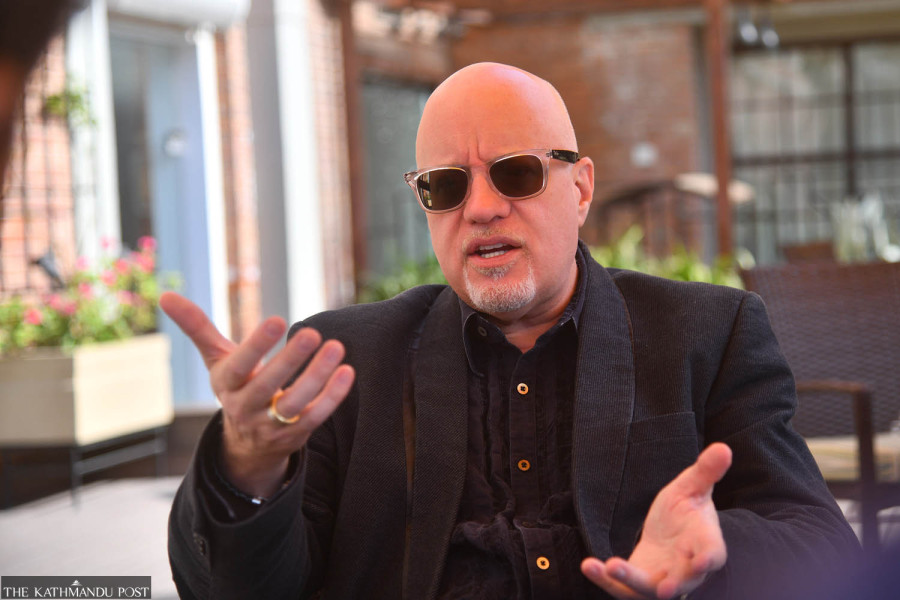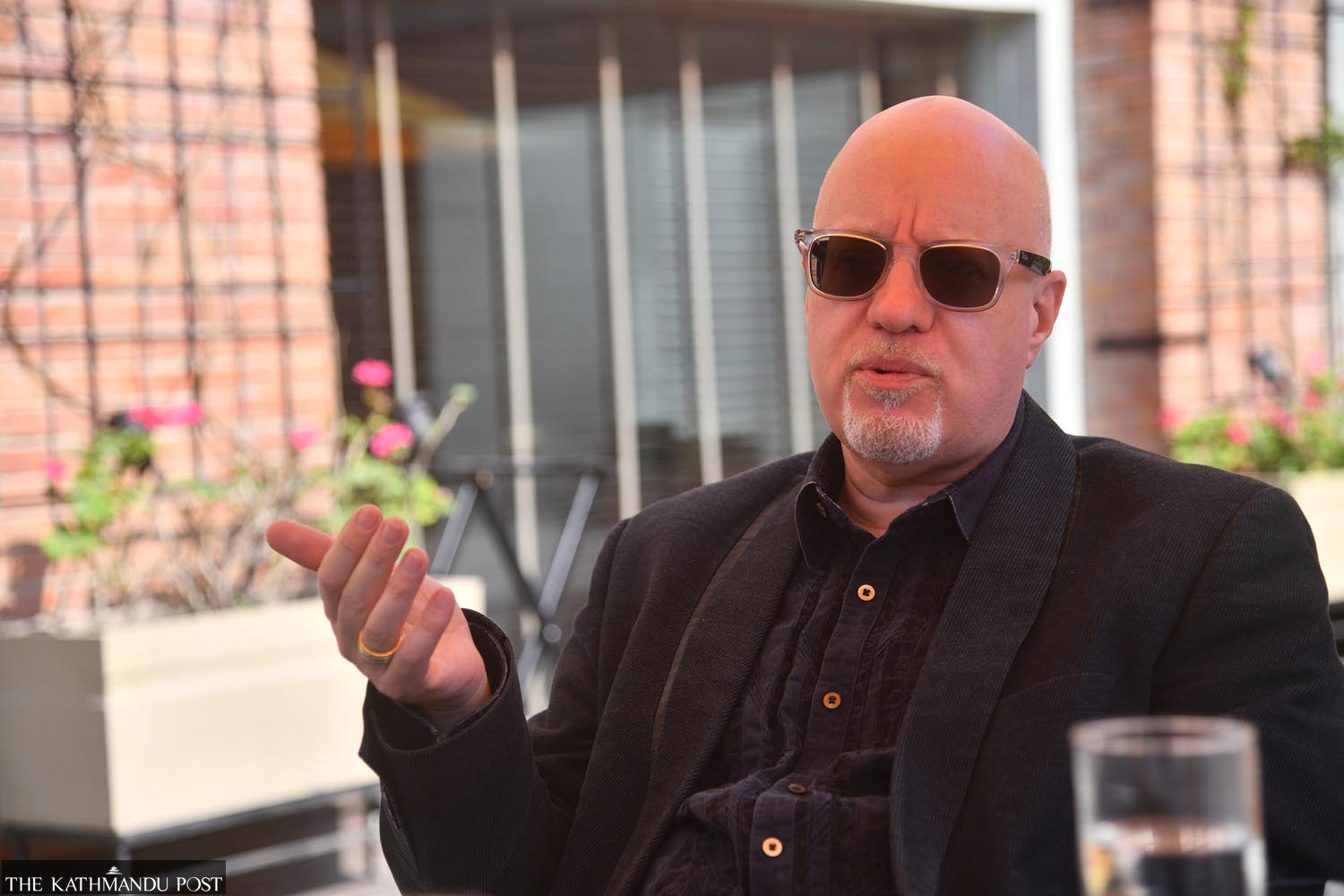Money
‘Mobile phone is the biggest tool for financial inclusion’
Brett King, an Australian futurist, says rapid digital development in China and India would enable Nepal to become a cashless society by early 2030.
Krishana Prasain
The use of mobile banking, internet banking and digital wallets has been rising in recent years. As Nepal aims to transition towards cashless society, it has been signing agreements with various countries to permit online cross-border digital payment. Nepal has signed agreements with India, China and Sri Lanka for cross-border digital payments. Brett King, an Australian futurist, author and co-founder of Moven, a New York-based mobile banking startup, has spoken in over 50 countries and previously advised the Obama Administration on fintech policy. The Post’s Krishana Prasain caught up with King, who is in Nepal to attend a banking event, to talk about Nepal’s fintech assessment, and ways to overcome challenges to become a cashless society. Excerpts:
How far has fintech evolved in Nepal as per your assessment?
The main fintech that people would use is the mobile wallet ecosystem. I was in Everest base camp Thursday, and the hotel there accepted Fonepay. I am thrilled to see the development. Looking at China and India or African countries, in most cases, e-wallets dominate. Remittances are important for Nepal. Electronic remittance services are facilitating a very rapid flow of capital into the country, which I believe is important for economic sustainability. The easier you make for Nepali workers abroad to send their money home, the better impact it will have on the economy.
Beyond that, I would say the emergence of new types of banks, for instance, WeBank in China, has about half of the customer base who are first-time banking users. They started with very small loans, which can be $50. And banks cannot provide that type of lending as it is too small. As fintech is operationally cash efficient and relies on technology, it can deliver these services at scale for lower-income people. Apart from financial inclusion, one of the biggest factors stimulating the economy is giving people access to banking and credit. For instance, farmers who are trying to expand their businesses can benefit from access to credit through a mobile wallet that enables them to buy more seeds and stock. But in a cash economy, it is much more difficult.
The fintech startups in Nepal are grappling with a shortage of adequate policies, insufficient physical infrastructure, subpar corporate governance, and a lack of proper strategy for sustained business operations during times of crisis. What can be done to overcome these challenges?
Yes, there are challenges. These startups will gradually begin to understand their roles and some of these roles are changing rapidly as regulators learn about these. Generally, once those fintechs mature, we perceive them as less risky. For instance, in the early days, there were challenges in European banks like Monzo and Starling. Commentators said they would never be profitable and be able to take risks. Now such comments have proven to be false. Most banks are profitable now, some are highly profitable. Secondly, the mobile wallet infrastructure around the world has 30-50 percent lower credit risk as an institution than traditional banks. In China, AliPay is providing SME lending, which is half the ratio of bank lending to that of SMEs, and that’s why they command a 40 percent market share now. The Nubank in Latin America has a 30 percent lower delinquency rate on credit cards. So, when fintech matures it will be able to manage risk more efficiently than the traditional players. It is the process of how regulators can help educate those fintechs to get through that stage, and this comes with licensing infrastructure. Licensing fintech like traditional banks is risky in itself, and imposing traditional costs like capital adequacy requirements and cumbersome compliance processes on fintech could potentially kill them. Regulation should be tailored to suit their developmental stage.

Nepal's digital transactions started picking up after the Covid pandemic. The rise in digital transactions equally increases the risk of digital fraud and theft. How can a country like Nepal tackle the situation?
Digital fraud and theft are major problems much of the world has been dealing with. The US saw a 30 percent increase in digital fraud last year. It comes due to a lack of identity infrastructure. The countries that have been able to reduce fraud in the Asian region are China and India. The countries have involved two elements—one is the use of biometrics or fingerprint, facial recognition, and the other is voice technologies. Artificial Intelligence (AI) has become a highly powerful tool for fraud detection. In 7-10 years, the use of quantum computing to secure encryption in the digital layer is going to be important. But compared to the traditional approach of banking with a signature or the use of cash, there is much less fraud and theft in digital space. Despite cybersecurity concerns, generally speaking, digital banking is still much safer. We are building tools to solve the existing problems.
How can fintech help to bring unbanked people into the banking channel?
The major improvements in financial accessibility and inclusion globally are due to the mobile phone. This year, for the first time, more people use their mobile wallets for their day-to-day banking than those who use bank accounts. This is happening mainly in developing economies where there is not a lot of banking infrastructure. The emergence of mobile technology gives people access to banking for the first time. For instance, in Sub-Saharan Africa, a study done in 2016 by Accenture and Standard Bank found that 70 percent of the Sub-Saharan and African populations would have to spend an entire month's salary just to get to a bank branch to open a bank account. Financial inclusion cannot be achieved just by opening more banks. The mobile phone is the answer. That is why we have 1.6 billion people coming to the financial system for the first time since 2011. Ultimately, the mobile phone is the biggest tool for financial inclusion.
Given the dominance of the traditional banking industry, is it possible for Nepal to become a cashless society?
Some economies like Japan and Germany are still relying heavily on cash. But looking globally, the whole world is going cashless. I visited China many times. In the 2000s, China was a dominant cash economy. While visiting China in 2012, saying that it would become cashless in a decade, people would say you were crazy. But now 92 percent of Chinese retail transactions are done with mobile money. So, I would say that in Nepal, it is inevitable that the country will be cashless. But the question is when. Given what is happening in China and India, with both economies moving towards cashlessness, probably by the early 2030s, I would expect that Nepal would be a cashless society.




 13.12°C Kathmandu
13.12°C Kathmandu













